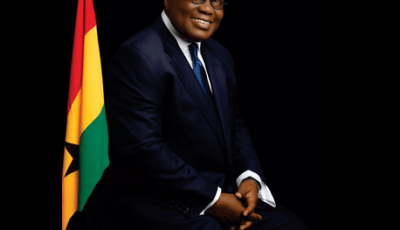Warning: Undefined array key "dirname" in /home/anapuafm/public_html/wp-content/themes/anapuafm/include/plugin/filosofo-image/filosofo-custom-image-sizes.php on line 133
Warning: Undefined array key "extension" in /home/anapuafm/public_html/wp-content/themes/anapuafm/include/plugin/filosofo-image/filosofo-custom-image-sizes.php on line 134
Profile of President-elect Nana Akufo-Addo
GNA – The President-Elect, Nana Addo Dankwa Akufo-Addo, possesses an impressive record of national political activism and achievements that spans a period of four decades.
Biography of the President-Elect
Nana Akufo-Addo was born on March 29, 1944 and raised in Swalaba in Ghana’s Capital, Accra, to Mr. Edward Akufo-Addo and Mrs Adeline Akufo-Addo.
He hails from Kyebi and Akropong Akuapem in the Eastern Region.
His father was the third Chief Justice of Ghana from 1966-1970 and non-executive President from 1970-1972.
His father’s residence, Betty House at Korle Wokon in Accra, was effectively the headquarters of the country’s first political party, the United Gold Coast Convention (UGCC), after it was formed at Saltpond on 4th August, 1947.
Three of the ‘Big Six’ – the founding fathers of Ghana – were his relatives: J.B. Danquah (grand uncle), William Ofori-Atta (uncle) and Edward Akufo-Addo (father).
Nana Addo is married to Rebecca Akufo-Addo (née Griffiths-Randolph). They have five daughters and five grandchildren.
Educational Background
Akufo-Addo received his primary education at the Government Boys School, Adabraka, and later at the Rowe Road School (now Kimbu), both in Accra Central.
He went to England to study for his O-Level and A-Level examinations at Lancing College, Sussex.
He returned to Ghana in 1962 to teach at Accra Academy Secondary School, before going to read Economics at the University of Ghana, Legon, in 1964, earning a BSc (Economics) degree in 1967.
He subsequently studied law in the United Kingdom, and was called to the English Bar (Middle Temple) in July 1971. Nana Akufo-Addo was called to the Ghana bar in July 1975.
Akufo-Addo stayed in France for five years as a lawyer at the now-defunct New York-based international law firm, Coudert Frères.
In 1975, he returned to Ghana to continue with his legal career.
He joined the chambers of U.V. Campbell from 1975 to 1979 and co-founded the law firm Akufo-Addo, Prempeh & Co.
Insight into His Business Acumen
Nana Akufo-Addo was the first Chairperson of DHL, Ghana Limited; Chairperson, Kinesec Communications Company Limited, publishers of the Statesman newspaper, and the first Chairperson of the Ghana Committee on Human and Peoples Rights.
Political Career
Akufo-Addo served as the General Secretary of People’s Movement for Freedom and Justice (PMFJ).This group led the “NO” campaign in the UNIGOV referendum of 1978 under General Ignatius Kutu Acheampong administration, designed to solicit support against a one-party military government.
In 1991, Akufo-Addo served as the Chairman of the Organising Committee of the Danquah-Busia Memorial Club.
He travelled throughout the country to establish branches of the Club. These branches eventually metamorphosed into local organs of the New Patriotic Party (NPP) prior to the 1992 general election.
In 1992, he was elected the first National Organiser of the NPP and later became the campaign manager of the party’s first presidential candidate, Professor Albert Adu Boahen.
In 1995, he led the “Kume Preko” (Kill Me Now) demonstrations of the Alliance for Change (AFC), a broad-based political pressure group, to protest the harsh economic conditions of the Rawlings’ administration.
Nana Addo was elected three times from 1996 – 2008 as the Member of Parliament for Abuakwa South in the Eastern Region.
He served his nation from 2001 to 2007 as Cabinet Minister, Attorney-General and Minister of Justice, and later as a Foreign Minister under the administration of President John Agyekum Kufuor with brilliance and distinction.
As Attorney General, Akufo-Addo had the satisfaction of being responsible for the repeal of the Criminal Libel Law, a law that had hitherto been used to intimidate the media and criminalise free speech.
The repeal had enabled the Ghanaian media to become one of the most vibrant on the African continent.
As Foreign Minister, he was fully involved in the successful ECOWAS peace efforts in Sierra Leone, Liberia, Cote d’Ivoire and Guinea Bissau, and was chairman of the ECOWAS Mediation and Security Council in 2003.
Akufo-Addo resigned from the Kufuor government in July 2007 to contest for the position of presidential candidate of his Party for the 2008 national elections.
He competed against 16 other candidates in the Party and won 48 per cent of the votes in the first round, but was given a unanimous endorsement in the second round, making him the NPP’s presidential candidate for the 2008 presidential race.
In the December 7, 2008 presidential race, Nana Akufo-Addo received 4,159,439 votes representing 49.13 per cent of the valid votes cast, in the first round, but was not enough for the 50 plus one percent needed for an outright victory.
In the run-off, Nana Akufo-Addo lost to the National Democratic Congress’s (NDC) Presidential Candidate, Professor John Evans Atta Mills.
Akufo-Addo again contested in the 2012 national elections against the NDC candidate, John Dramani Mahama after the demise of President Atta-Mills on July 24, 2012.
That election generated considerable controversy, and was finally decided by the Supreme Court in a narrow 5/4 verdict in favour of Mr Mahama.
In the 2016 elections, Nana Akufo-Addo competed against six other presidential candidates including President Mahama, of the ruling NDC, Mr Ivor Kobina Greenstreet of the Convention People’s Party and Dr Paa Kwesi Nduom of the Progressive People’s Party.
The rest were Nana Konadu Agyeman-Rawlings of the National Democratic Party, Dr Edward Mahama of the People’s National Convention and Mr Jacob Osei Yeboah, an independent candidate.
Nana Addo polled 5,716,026 votes representing 53.85 per cent as against his main rival, President Mahama’s 4,713,277 votes representing 44.40 per cent to win the contest in the first round.
Nana Addo would have the arduous task of fulfilling the high expectations of Ghanaians including creating jobs for the teeming unemployed youth, stabilising the country’s foreign exchange rate, ensuring frequent supply of electricity for commercial and domestic users and other key promises he made during the electioneering.
GNA




